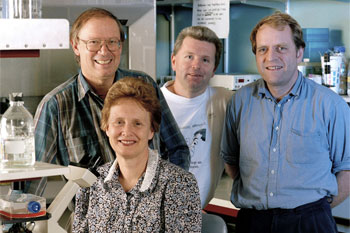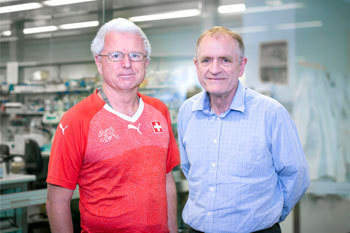

Academy Fellows Professor David Vaux and Professor Andreas Strasser have been awarded the 2019 CSL Florey Medal for their research toward understanding the role of programmed cell death, knows as apoptosis, in cancer and autoimmune disease.
The molecular biologists work at the Walter and Eliza Hall Institute of Medical Research where they have been making important discoveries over the last 30 years into the control of apoptosis and how this knowledge can be exploited to develop new medical treatments for cancer and other diseases.
Apoptosis ensures that old or damaged cells die and don’t remain to cause disease. It is an important process in living organisms, both during development and for ensuring homeostasis.
Work by the researchers identified that the function of a protein named Bcl-2 was to stop apoptosis and keep cells alive. By studying the role and regulation of Bcl-2, they showed that not all cancer is caused by uncontrolled cell multiplication, it can also be caused by cells that do not follow the normal program of cell death—effectively they ‘fail to die’.
The findings of Professor Vaux and Professor Strasser have sparked a whole new field of investigation into apoptosis and the origins of cancer and autoimmune disease. Their work has also led to the development of new treatments based on drugs designed to inhibit Bcl-2 and its relatives and thus encourage normal cell death.
On the basis of their findings, a potent new inhibitor of Bcl-2, developed by others at the Walter and Eliza Hall Institute in collaboration with US pharmaceutical companies Genentech (a member of the Roche Group) and AbbVie, is now being used to treat leukaemia around the world. Other group leaders at WEHI who were also involved in the generation of this powerful new treatment for cancer include Jerry Adams, Suzanne Cory, David Huang, Philippe Bouillet, Peter Colman, Keith Watson, Guillaume Lessene, Andrew Roberts, Ben Kile and Peter Czabotar.
The Australian Institute of Policy and Science established the Florey Medal in 1998, named in honour of Sir Howard Florey, the Australian Nobel Prize-winning scientist who developed penicillin. Academy Fellows feature strongly: the inaugural award in 1998 was made to Professor Barry Marshall and Professor Robin Warren, who since became Academy Fellows and Nobel Laureates. Another six Fellows have also received the award.
The medal is awarded biennially to an Australian researcher or researchers for significant lifetime achievement in biomedical science or human health advancement. In addition to the silver medal, there is a prize of $50,000 thanks to the support of CSL Limited.
© 2025 Australian Academy of Science